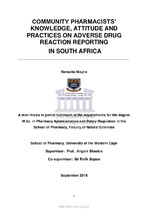| dc.description.abstract | Pharmacovigilance involves the management of sub-standard drugs, medication
errors, ―off-licence‖ drugs, abuse and misuse, lack of efficacy, poisoning, adverse
drug reactions (ADRs), drug interactions, expired stock destruction and drug-related
mortality.
Regulators and the pharmaceutical industry rely on healthcare professionals,
including pharmacists, to report ADRs. The majority of pharmacists work in retail
community pharmacies and they are often the first point of contact when ADRs are
experienced, since self-medication, misuse of over-the-counter (OTC) medicines,
vitamins and traditional medicines, increase the probability of ADRs. In South Africa
(SA) ADRs have been known to cause adult deaths and hospital admissions.
In first-world communities, pharmacovigilance is more common among pharmacists,
however in South Africa, ADR reporting compares poorly. Studies in the public
sector have found that pharmacists lack pharmacovigilance knowledge and
underreport ADRs. In comparison the pharmacovigilance knowledge and practice
patterns among retail community pharmacists is poorly documented. | en_US |

